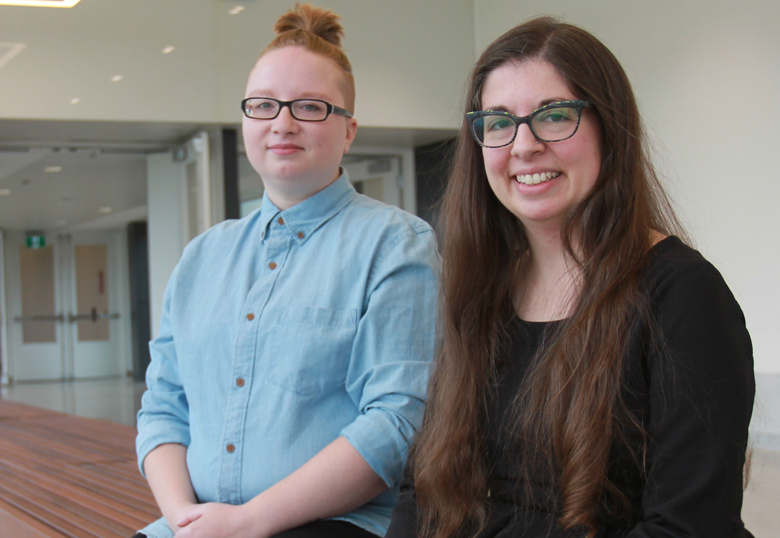A new University of Lethbridge research project that proposes to chronicle the history of Gay Straight Alliances (GSAs) in the province of Alberta has been selected as the winner of the 2019 Parkland Institute Faculty Research Award.

The project, GSAs in Alberta: Past, Present, and Future, is a collaborative study led by Dr. Athena Elafros (assistant professor of sociology), sessional instructor Tif Semach (BA ’12, MA ’14) and fourth-year undergraduate student Wednesday Culley. The group aims to create a record of Alberta GSAs by capturing the oral histories of those involved from the early 2000s to the present. In addition to preserving these experiences for current and future policy analysis, the project will create a public repository and collaborate with stakeholders to ensure the preservation of data in Canadian LGBTQ2S+ archives.
“I’m just really interested in capturing something that is so ephemeral. There really isn’t any record of this and it’s a really important thing for the queer community of which I identify as part of,” says Semach, who is also the community education coordinator for OUTreach Southern Alberta. “It’s also a chance to really track the evolution of LGBTQ rights in Alberta.”
Elafros researched GSAs as part of her doctoral program at McMaster University and co-published two papers with, among others, Dr. Tina Fetner, current president of the Canadian Sociological Association. With an inherent interest in the topic, she began speaking with Semach and the idea for the project took shape.

“We really started talking about the fact that there is no record of this very important history in the province,” she says. “Working together, we came up with the idea to do the oral history component. Given my two colleagues’ connections in the community, we thought it’d be a good way to access participants and give them a chance to talk about their experiences and share them with other people who might be experiencing similar issues.”
Semach played a key role in starting the city’s first GSA, and only the second in the province, when she was a student at Lethbridge Collegiate Institute (LCI) in 2003. A decade later, Culley was involved with the GSA at LCI, while Culley’s father worked as a board trustee for Lethbridge School District No. 51 and touted the implementation of safe and inclusive policies in the district.
“I’ve sort of lived and breathed these topics for a long time,” says Culley. “We’re primarily looking for people who have participated in GSAs, and it doesn’t matter the experience, just people who were involved with them in any capacity. Being able to access different people who have experienced things maybe two years ago versus 10 years ago allows us to see a wide array of experiences and how things have changed over time.”
The project will involve a lot of ground work and take place over the next year.
“We’re going to start here in Lethbridge and then kind of branch out to Calgary, Red Deer, Edmonton and hopefully some of the rural areas as well,” says Semach. “It’ll mainly just be a case of reaching out and letting people know we are doing this largely from a queer perspective, so we are working from within the community and are a safe voice looking to capture their stories.”
Elafros says the Parkland award is welcome recognition for the legitimacy of the study, especially in the current political climate. And while much of the current literature on GSAs is focused on the present, this study offers a historical perspective and will highlight broader outcomes.
“A lot of conventional historical accounts focus on people or groups with power, those without power or prominence often being left out,” says Dr. Trevor Harrison, U of L sociologist and director of the Parkland Institute. “The research being conducted by Dr. Elafros and her colleagues is important in addressing this absence. Additionally, because the present is always informed by the past, such research also points to contemporary issues of how the LGBTQ2S+ community still experiences prejudice and exclusion in Lethbridge.”
For Semach, the data they acquire will be integral for future programming and policy decisions.
“From the perspective of a community advocacy organization, a lot of what we are doing right now at OUTreach is looking at what our community needs,” she says. “Having access to data like we will be acquiring — the real, lived experience of people in Alberta — will allow us to then go out to organizations and advise perhaps on how policies should be focused. It’ll really allow for us to make decisions based on data.”
